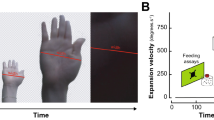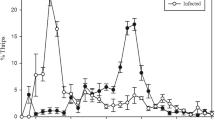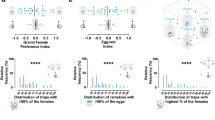Abstract
IN studies of the host-seeking behaviour of laboratory-reared Ædes ægypti, response of these mosquitoes to a constant source of heat and moisture was observed. Newly emerged mosquitoes were placed in a 9 cu. ft. cage, and the numbers which probed over a convection current of warm, moist air (80–83°F.), rising into the cage through a port beneath its screen floor, were counted each day in a 16-minute observation.
This is a preview of subscription content, access via your institution
Access options
Subscribe to this journal
Receive 51 print issues and online access
$199.00 per year
only $3.90 per issue
Buy this article
- Purchase on Springer Link
- Instant access to full article PDF
Prices may be subject to local taxes which are calculated during checkout
Similar content being viewed by others
References
Lavoipierre, M. M. J., Nature, 181, 1781 (1958).
Lavoipierre, M. M. J., Nature, 182, 1567 (1958).
Author information
Authors and Affiliations
Rights and permissions
About this article
Cite this article
BURGESS, L. Probing Behaviour of Ædes ægypti (L.) in Response to Heat and Moisture. Nature 184, 1968–1969 (1959). https://doi.org/10.1038/1841968a0
Issue Date:
DOI: https://doi.org/10.1038/1841968a0
This article is cited by
-
Mosquito repellence induced by tarsal contact with hydrophobic liquids
Scientific Reports (2020)
-
Feeding Site Selection by Frog-Biting Midges (Diptera: Corethrellidae) on Anuran Hosts
Journal of Insect Behavior (2014)
-
The role of proboscis of the malaria vector mosquito Anopheles stephensi in host-seeking behavior
Parasites & Vectors (2011)
-
10.1007/BF00290700
CrossRef Listing of Deleted DOIs (2011)
-
Are the most numerous sensilla of terrestrial isopods hygroreceptors? Ultrastructure of the dorsal tricorn sensilla of Porcellio scaber
Cell & Tissue Research (1995)
Comments
By submitting a comment you agree to abide by our Terms and Community Guidelines. If you find something abusive or that does not comply with our terms or guidelines please flag it as inappropriate.



